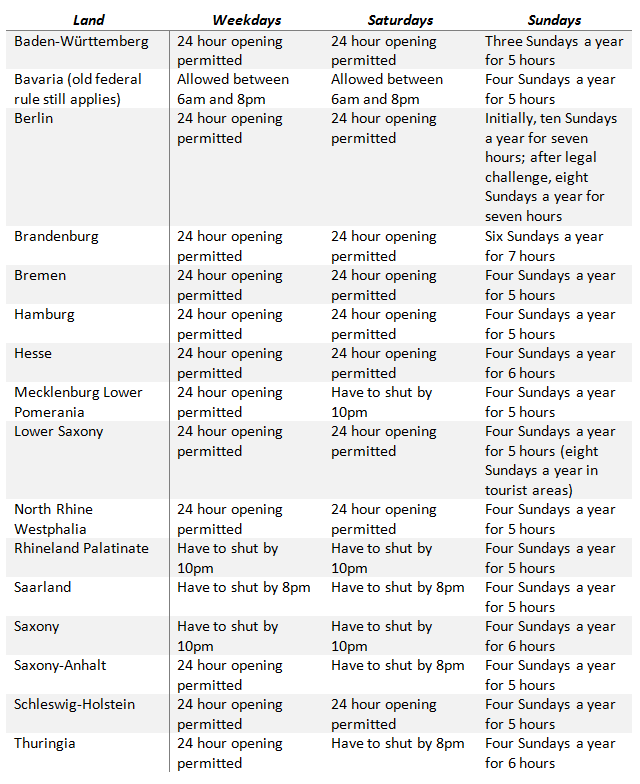 Sunday trading rules vary considerably across Europe, with some countries allowing shops to open freely, while others have tight restrictions on opening hours. In light of a proposal to decentralise restrictions on Sunday trading in England and Wales, Ed Turner writes on the lessons Germany’s decentralisation of Sunday trading laws could provide for other countries. He notes that if the German experience held true, it could be expected that there would be a gradual move toward removing restrictions under such a proposal, with politicians divided on the issue, and variations driven by regional economic interests.
Sunday trading rules vary considerably across Europe, with some countries allowing shops to open freely, while others have tight restrictions on opening hours. In light of a proposal to decentralise restrictions on Sunday trading in England and Wales, Ed Turner writes on the lessons Germany’s decentralisation of Sunday trading laws could provide for other countries. He notes that if the German experience held true, it could be expected that there would be a gradual move toward removing restrictions under such a proposal, with politicians divided on the issue, and variations driven by regional economic interests.
One controversial feature of the recent budget announced in the UK at the start of July was the proposal to allow “mayors or Councils to extend Sunday trading for additional hours within parameters that they would determine”. It will be interesting to see whether this leads to wholesale liberalisation, whether different areas pursue different priorities (and if so, whether these are motivated by the political convictions of local politicians or by local circumstances, such as the degree of pressure from traders), or whether relatively little changes.
In considering the possible impact, Germany provides an interesting point of comparison. For most of the post-war period, shop opening hours were a matter for “concurrent” legislation, that is, where both the federal government and the regions (Länder) could legislate. In 1956, the federal government did precisely that, with a law agreed that distinguished between regular weekday opening (allowed between 6am and 8pm), and Sundays and Bank Holidays (opening only allowed in certain, limited sectors, otherwise on four Sundays a year for five hours).
As part of some reforms to the federal system in 1994, the ability of the federal government to use concurrent legislation was restricted, and it was only possible to maintain equivalent living conditions or achieve legal or economy unity, and a ruling issued by the Federal Constitutional Court in 2004 clarified that shop opening hours did not meet the criteria set out in the Basic Law for the national legislation to be passed. This verdict influenced legislators, and in 2006 reforms to the German federal system appeared, squarely, to pass power from the federal government to the Länder.
Drawing upon a discussion by Hans-Peter Schneider (pp. 408-439), we can see both a clear “direction of travel” (towards liberalisation, especially during the working week), but also some regional variation. Current laws are summarised in the table below (for the sake of simplicity, this excludes details on bank holidays, and exceptions for certain categories of retail, such as in tourist areas and airports).
Table: Sunday trading laws in Germany
Note: Compiled by author
There are two noteworthy points of detail about specific Länder. Bavaria has not adopted a new law (perhaps surprisingly, as the Land most enthusiastic about gaining additional policy competences). The Land – noted for the high proportion of Catholics and strong electoral performance of its own branch of Christian Democracy, the Christian Social Union (which tends to be more conservative than Christian Democrats elsewhere in Germany) – rejected change, in spite of support from the prime minister at the time. In Berlin, the decision to allow opening on ten Sundays a year was challenged by the local churches, and the Federal Constitutional Court ruled that the rule (which allowed opening on all Sundays at Christmas time) was incompatible with constitutional protections on religion and therefore of workers’ rights on Sundays, and this was amended to allow opening on eight Sundays a year.
Looking more broadly, there are three general conclusions that can be drawn from the German experience, and which offer a possible pointer to what will happen in England and Wales. First, the general trend is most certainly for liberalisation of opening hours. Just a few Länder (Rhineland-Palatinate, Bavaria, the Saarland and Saxony), three of which are noted for their high proportion of Catholics, have kept with more restrictive rules during the week.
Second, party politics does not seem to play a major role here – Bavaria, Saxony and the Saarland have been led by Christian Democrats throughout this period, while Rhineland-Palatinate has been led by Social Democrats. Interestingly, while the left-wing parties (SPD and Die Linke) argued for restrictions when in opposition, in Berlin it was a coalition of these two parties that passed the most liberal law in Germany.
Thirdly, there is some variation which appears to be driven by regional circumstances; at times this is around matters of detail, such as bank holidays which only exist in particular states, or particular provisions for tourist areas. More generally, though, it would appear to be related to the likely economic gains: in Berlin, with its importance as a tourist destination, the most liberal rules were adopted, while in eastern Länder, except Brandenburg, relatively low purchasing power of consumers, according to Schneider, meant that they perceived gains from opening. In addition, according to an emerging research by Iris Reus, Bremen (next to Lower Saxony) and Brandenburg (next to Berlin) were minded to minimise economic disadvantage that might be suffered from having much more restrictive laws than their neighbours.
If this change is implemented in England and Wales, the German experience would lead us to expect a trend toward liberalisation across the board, differences between politicians of the same political “family” (on the right, at least, according to whether they are of a “traditionalist” or “market liberal” inclination), and variations driven by whether economic gains are considered to be likely (as they will be in certain areas and tourist centres).
Note: This was originally published on our sister site the LSE’s EUROPP blog on European Politics and Policy. Featured image credit: Michael Bertulat (CC-BY-SA-3.0)

Ed Turner is Lecturer in Politics at Aston University, based in the Aston Centre for Europe. He specialises in German politics and is author of Political Parties and Public Policy in the German Länder: When Parties Matter (Palgrave Macmillan 2011). He held, with Carolyn Rowe a grant from the German Academic Exchange Service to investigate the current state of German federalism, and recently published a paper on the impact of Germany’s federalism reforms with the IPPR.









I object strongly to the substitution of UK for England and Wales in this article. How will the UK learn lessons when the laws are only changed in England and Wales? Why look to Germany for change when Scotland can show the result of removing a lot of restrictions on Sunday trading?